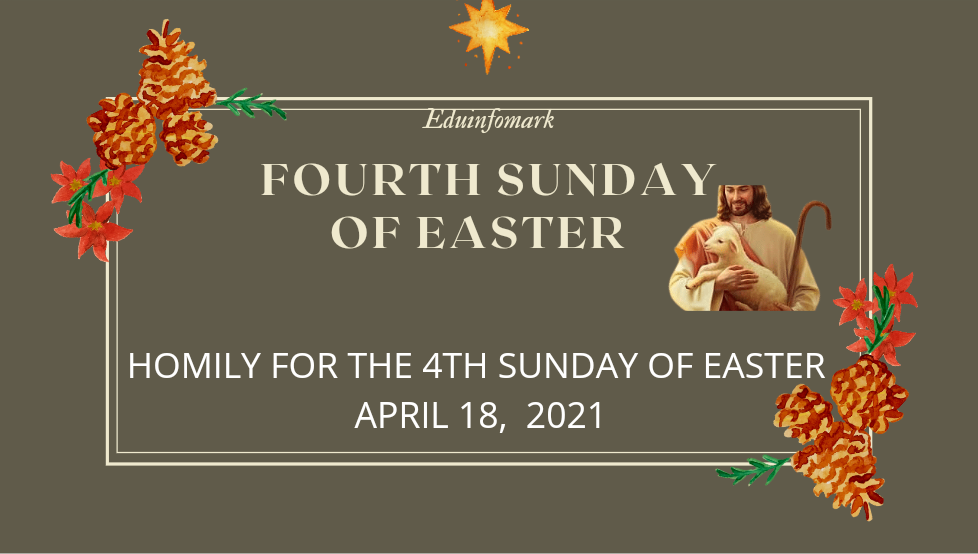
GOOD SHEPHERD SUNDAY/FEAST OF ST. MARK THE EVANGELIST

What are your interests in people? Unless we begin to live selflessly and evaluate our success and happiness in life based on the lives we’ve positively touched, our life is valueless and selfish.
My Dearest Friends in Christ,
I welcome you to yet another Sunday of the Lord; a very special Sunday that reminds us of the urgency and the need to be good shepherds of God’s flock and to offer prayers for vocations. We are here to remind each other of our responsibilities as shepherds of God’s people. This responsibility is seriously diminishing in value in our egotistical and materialistic society. In the quest to satisfy their personal desires, ambitions, and needs, modern people tend to think more of themselves than those around them. Characteristically, good shepherding implies an altruistic and not an egoistical disposition. Jesus the Risen Lord, exemplified such altruism by offering Himself to die for His flock. Jesus is the Good Shepherd. We too are called to imitate His example.
Are you a hired laborer (bad shepherd) or a good shepherd ? In the Old Testament God lamented the bad shepherds, “Doom for the shepherds who allow the flock of My pasture to be destroyed and scattered”(Jer 23:1). “Trouble for the shepherds of Israel who feed themselves! Shepherds ought to feed their flock.” (Ez 34:2) This distinction between good shepherds and bad shepherds needs to be made in order to help us to reflect, deeply on our various vocations. Anyone, who has someone or some people entrusted to their care, by way of employment, volunteer work or vocation is called to be a shepherd. Yet experience has shown that many lack the virtue of compassion, the disposition, the availability, patience, tolerance, ability to sacrifice, and meekness that characterize a good shepherd. Many “prey on” instead of “praying for” those entrusted to their care. For many, the principal motivation for service is far from “caring for ” but the “wages from”. These uncaring shepherds work as hired laborers who have no sympathy or affection for those they serve. They lack commitment to their duties. When they shepherd it is because the wages or the glory are attractive. Look at what is happening in the sphere of public service today: We have leaders who care more about themselves and their families than those they lead. Is not this the cause of bad Governments in the world today ? In the private sphere, we live in a world where surveillance cameras and technological equipment are deployed to monitor those working. Many do well when monitored but slack off when not monitored. The question is, do you really need to be monitored before you intentionally care for those enstrusted to you? What happens if you are not monitored ? Let’s be more human in discharging our responsibilities. God will reward every act of goodness shown to others.
The first reading of today, highlights the testimony of Peter who made it clear to the Jewish leaders that there is no salvation except through Christ, whom they rejected and that it was through Him that the sick were healed. Like Jesus we are called to heal a wounded world. Many are weak and wounded; let’s be more compassionate and patient in dealing with people around us.
The good shepherd cares for the welfare of his flock, but the hired labourer or bad shepherd cares only for his own welfare.
John, in today’s second reading, reminds his people that they should remember their privileges. First, it is their privilege to be called the Children of God. John clarifies that we are not merely called the Children of God; we are God’s Children in actuality. It is by grace through Baptism that we become God’s Children. The more we know and love the God in whom we believe, the more we will strive to act and live as God’s Children. In other words, we become like the God in whom we believe. As the culmination of all our privileges as Children of God, when Christ appears, we shall see Him “as He really is,” and we shall be like Him. As God’s Children we imitate God our Father in being true shepherds of His flock.
In the Old Testament, the image of the Shepherd is often applied to God as well as to the leaders of the people. The book of Exodus several times calls Yahweh a Shepherd. Likewise, the prophets Isaiah and Ezekiel compare Yahweh’s care and protection of His people to that of a shepherd. “He is like a shepherd feeding His flock, gathering lambs in His arms, holding them against His breast and leading the mother ewes to their rest.” (Is 40:11) Ezekiel presents God as a loving Shepherd Who searches diligently for His lost sheep.
In the Gospel of today, Jesus calls Himself the Good Shepherd. He tells us that 1)He knows His sheep and they hear His voice. 2)He gives them eternal life. 3)He protects them.4)He dies for them. God is challenging us today with these qualities of a good shepherd. So let us identify with those entrusted to us in every experience of their lives. The more we get to know them the more they listen and understand us. Let’s offer them life, an opportunity to grow and succeed. God gives us life through the sacraments. Let our words and actions give people hope and encouragement. It is our duty to protect them and not to expose them to physical or spiritual danger and harm. We need to be vigilant in looking after them. We must make sacrifices for those for whom we are called to care. It is dying to self that we can offer life to those in need. It is not about us but about them. Jesus laid down His life for us: We too must not spare anything in offering the best of ourselves to those we serve. Remember there are those who are outside the boundaries of our jurisdiction. Sheep who do not belong to this fold,must also be cared for and loved. There must be no discrimination of any sort. We are all one in Christ Jesus.
In whatever profession or role in life you find yourself be a good shepherd. Let us also be good sheep in our parish communities. Let us be sheep that listen to the voice of their shepherd and jointly participate in building up the Church of God. Let us pray always for more vocations to the Diaconate, Priesthood, and Religious Life, that God will in every generation find worthy pastors and ministers of His Church.
May we eschew every form of selfish ambition in religious and civil service. Every opportunity to trade, work, volunteer, lead, and teach is a call to serve others. There is joy and fulfillment in what we do when we truly offer ourselves in sincere service to others as good shepherds. May God strengthen you as you care for others and may the Good Shepherd reward you unceasingly. “The Lord is our Shepherd there is nothing we shall want…”(Psalm 23).
Do not abandon prayer, even if life offers you no reasons to pray. Prayer is the inner strength for every good work
Tired of browsing the website, download our new eduinfomark mobile app on play store🖱



